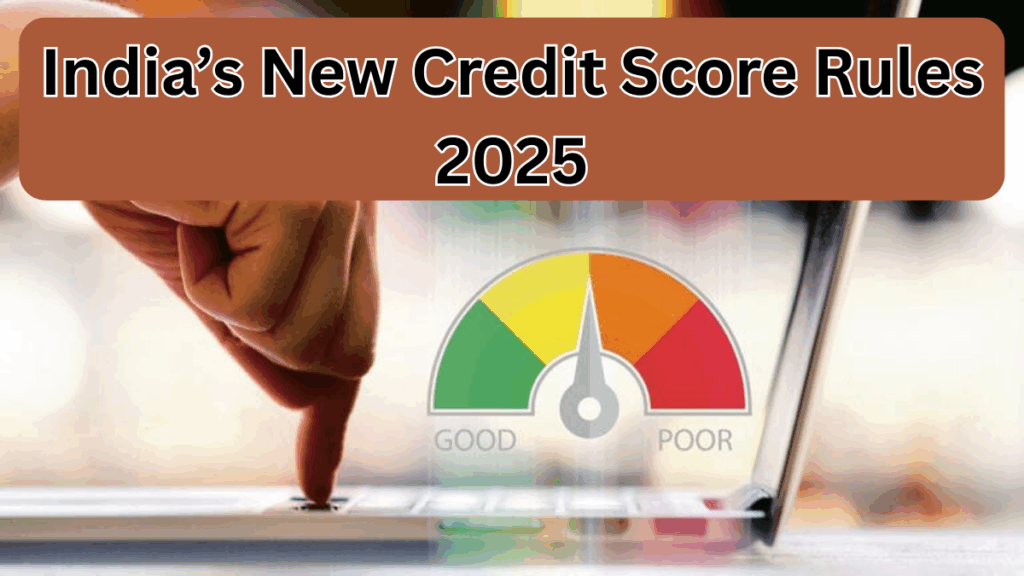In 2025, borrowing money in India won’t be the same anymore. The Reserve Bank of India (RBI) has introduced a fresh set of guidelines aimed at bringing more transparency and fairness into the credit ecosystem. Whether you’re eyeing a home loan, a car loan, or even a personal loan, these updates will directly impact your borrowing experience.
Let’s break down everything you need to know about India’s 2025 Credit Score Rules – What’s New.

Table of Contents
Why These New Rules Matter
With credit playing such a vital role in our financial lives, the RBI’s regulation overhaul ensures:
-
Better transparency for borrowers.
-
Fairer evaluations by lenders.
-
Quicker access to credit data.
-
Enhanced accountability of Credit Information Companies (CICs) like CIBIL.
Key Changes in India’s 2025 Credit Score Rules
Here’s a quick snapshot of what’s changing and how it could affect you:
Old System |
India’s 2025 Credit Score Rules – What’s New |
|---|---|
Limited free access to credit scores |
Mandatory free full credit report once a year from all CICs |
Vague reasons for loan rejections |
Lenders must explain rejection reasons clearly |
No standardized grievance redressal |
Centralized platform for disputing errors in reports |
CIBIL score dominated the industry |
Equal footing for all four CICs – CIBIL, Equifax, Experian, CRIF |
Inconsistent reporting from lenders |
Uniform data submission to CICs required |
How This Affects Borrowers Like You
If you’re planning to take out a loan or apply for a credit card in 2025, here’s what you’ll notice:
Easier Credit Access (If You Maintain a Good Score)
-
Banks and NBFCs will rely on transparent lending criteria.
-
A high credit score across any CIC (not just CIBIL) will work in your favor.
Harder to Get Away With Poor Credit Habits
-
Missed EMIs and defaults will now be uniformly reported.
-
Discrepancies in scores across CICs will be minimized.
You’ll Be More Informed
-
You’ll receive clear communication from lenders on loan rejection reasons.
-
You can request one free report every year to check your credit health.
Tips to Stay Ahead of the 2025 Rules
Here are a few borrower-friendly tips to make the most of the new regulations:
-
Check your credit report regularly – not just your CIBIL score but across all CICs.
-
Dispute errors immediately using the new centralized grievance redressal system.
-
Pay your EMIs on time to keep your score consistent across credit agencies.
-
Avoid multiple loan applications at once, as too many inquiries can affect your score.
The Bigger Picture: RBI’s Aim
The RBI’s updated credit score regulation policy is designed to:
-
Empower borrowers.
-
Promote financial discipline.
-
Enhance lender confidence.
-
Level the playing field among Credit Information Companies.
With these changes, India’s lending landscape is evolving toward more accountability, transparency, and fairness—something every borrower can appreciate.
FAQs
1. Will I still need to pay to check my credit score?
No. Under the new rules, all borrowers are entitled to one free full credit report per year from each of the four CICs, including CIBIL.
2. Can a loan be rejected based on a low score from just one credit bureau?
Not necessarily. Since all CICs now hold equal importance, lenders will consider data across multiple agencies, improving fairness.
3. How do I fix an error in my credit report under the new rules?
You can use the new centralized grievance redressal system to raise and track disputes with any CIC, including CIBIL.
4. Are these rules applicable to all types of loans?
Yes. These credit score regulations cover all types of personal and business loans, including housing, vehicle, credit card, and personal loans.
If you’re planning to borrow in the coming year, staying informed about India’s 2025 Credit Score Rules – What’s New is essential. These updates aren’t just regulatory changes—they’re tools that can help you take better control of your financial future.
Click here to learn more
